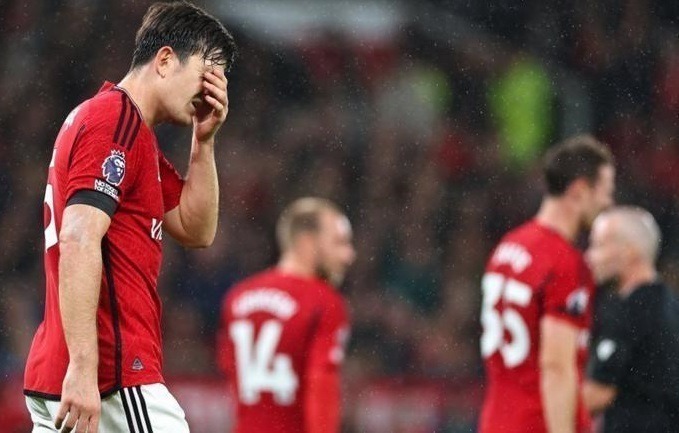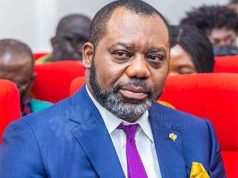
By Simon Stone (BBC)
Manchester United’s players endured another miserable afternoon on Sunday in the 3-0 home loss to Manchester City
As he tiptoed round the thorny issue of why Manchester City are so much better than Manchester United, Pep Guardiola was careful to be both respectful and protective of fellow manager Erik ten Hag.
But in speaking about his own club, Guardiola still managed to indirectly shine a light on the current state of his city rivals.
“I said many times we are in the same direction – chairman, CEO, sport director, manager and players,” he said.
“We make mistakes, of course, but when we lose or things are not going well we are not here to blame someone, we just see what we have to do to be better and find a solution.
“In my first season, we didn’t win. I didn’t find my chairman complaining, he supported me unconditionally. When we lost the Champions League final against Chelsea I was devastated. My chairman said, ‘Come on, we are going to win it, what can we do next? Let’s go.’
“When that happens we are not overexcited when we win and when we lose we are not dramatic. That’s why I think the club is so stable.”
In black and white, it seems so simple. Yet at United, with uncertainty over the ownership, a public falling-out between manager and players, supporter unrest and questions over recruitment, being stable is a status that seems totally beyond them.
So, just as happened during the tenures of Louis van Gaal, Jose Mourinho and Ole Gunnar Solskjaer, significant progress made in one season under Erik ten Hag is in danger of being swept away by regression and mediocrity in the next.
Could Manchester United have paid closer heed to Ralf Rangnick’s verdict?
Ralf Rangnick’s appointment as interim manager when Solskjaer was sacked in November 2021 is largely now widely regarded as a mistake.
Yet, when the German arrived at Old Trafford, one of the major attractions was the depth and breadth of his knowledge gained through his extensive work as a sporting director with the Red Bull group. The message was that this expertise would potentially be available to United for two additional years.
Rangnick came to some pretty clear conclusions, his first public assessment coming in March 2022, just before a 4-1 defeat at Manchester City.
“What is obvious, not only with Manchester City but also with Liverpool, is they have had continuity and consistency with their head coach, have a very clear identity and a clear idea of how they want to play,” he said.
“This idea is the headline for everything that happens in the club. This is the secret behind their success. It is what all the top clubs in Europe have in common. It is something that Manchester United needs to develop and improve in the next couple of years.”
The following month, after a 4-0 loss at Liverpool, Rangnick delivered an update.
“You don’t even need glasses to see and analyse where the problems are,” he explained. “It’s not enough to do some minor amendments – cosmetic things. In medicine you would say that this is an operation of the open heart.”
The problem for Rangnick was that not everyone at United agreed such surgery had to happen.
United focus on ‘easy deals’
Instead, they felt Ten Hag could deliver the improvement required through their own recruitment plan. They have given him in excess of £350m to execute it.
But, as some have observed, recruitment seems to have centred around doing ‘easy’ deals.
The arrival of Casemiro from Real Madrid last summer for an initial £60m fee was lauded, but it is worth recalling the 31-year-old started last season on the Real bench.
Christian Eriksen also came in on a free transfer, choosing to join United rather than sign an extended deal with Brentford. They also paid £13m to sign Tyrell Malacia on a four-year contract before, finally, Brazilian winger Antony came in on deadline day for £82m, the second biggest signing in the club’s history.
Could any of these deals be regarded as difficult?
It was the same with Rasmus Hojlund this summer – the £72m represented a virtual five-fold increase on the sum paid to Sturm Graz by Atalanta just 12 months earlier.
United also paid Chelsea £55m for Mason Mount, who had refused to sign a contract extension at Stamford Bridge, where he had one year left on his contract.
Andre Onana cost £47.2m after Ten Hag took the bold decision to ditch David de Gea, believing the Cameroon international’s superior ability with the ball at his feet would be a major positive.
And, while many feel England midfielder Declan Rice would have been a perfect fit at United, instead they ended up signing Sofyan Amrabat, initially on loan, from Fiorentina.
The Sancho saga and player problems
Aside from injuries to Luke Shaw, Lisandro Martinez, Casemiro and Aaron Wan-Bissaka, there was one other player whose services were not under consideration by Ten Hag against City.
While Jadon Sancho has not yet done much to justify the £73m Solskjaer paid for him two years ago, the continuing stand-off between the England winger and Ten Hag does not reflect well on either side.
Sancho has been encouraged by team-mates to deliver the apology Ten Hag demands for his inflammatory social media post, which came in response to his manager’s declaration he had been left out of the defeat at Arsenal on 3 September because of sub-standard training performances.
While BBC Sport has been told the Sancho situation is complicated, it was also pointed out such matters are better dealt with on the training field at the time.
But Sancho’s words, which have now been deleted, were damning and complained of the 23-year-old being made a “scapegoat”. Is it plausible he is the only player who feels this? And what does that say of Ten Hag and the way he has managed his squad?
Ten Hag arrived from Ajax almost 18 months ago, having forged the reputation of a modern-day coach committed to the pressing game.
He stated to Viaplay after Sunday’s 3-0 derby defeat to Guardiola’s City that he cannot replicate that at Old Trafford because he doesn’t have the players and instead he needs to be more direct.
Yet Match of the Day pundit Danny Murphy is not alone in thinking some of United’s more established players simply do not work hard enough.
Can Sir Jim Ratcliffe make his mark?
On top of this is United’s ongoing search for “strategic alternatives”, launched on 22 November last year with the aim of “enhancing the club’s future growth, with the ultimate goal of positioning the club to capitalise on opportunities both on the pitch and commercially”.
Following the withdrawal of Sheikh Jassim, who was adamant his bid to buy 100% of United was the best for the club, it now seems certain the other major bidder, Sir Jim Ratcliffe’s Ineos Group, will get involved with an initial 25% stake.
He will enter a club whose overall debt, including outstanding transfer fees, now stands at over £1bn.
It has been suggested Ratcliffe will have control of all sporting matters but, in a commercial enterprise the size of United, that in itself feels complicated. Even those close to Ratcliffe wonder how someone as controlling as the 71-year-old will work alongside the Glazer family, who have driven the commercial side of the club and not been scared to make decisions that benefit them no matter what outside criticism it draws.
Had Sir Bobby Charlton’s death not taken precedence, it would be easy to imagine the prospect of the Glazer family remaining ‘in charge’ at Old Trafford drawing more supporter protests. Given the outcome of last Sunday’s game, it is inevitable the fan disquiet will resurface pretty soon.
Evidently, this whole situation is way off the serene picture painted by Guardiola of life on the blue half of the city. Positive results can mask inherent issues. But they also make it easier to deal with them, away from the glare created by defeats and below-par performances, which is where United and Ten Hag are right now.
Eighteen months ago, Rangnick gave them the answers. But no-one listened.

































